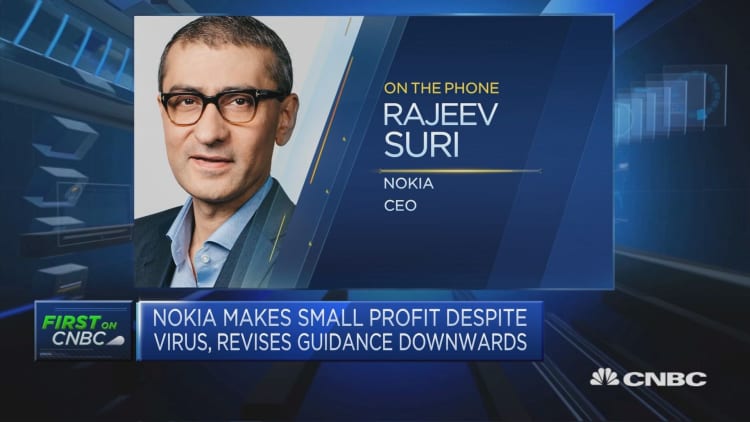
Nokia President and CEO, Rajeev Suri, has admitted that 5G rollouts in Europe could be delayed as a result of the coronavirus pandemic.
5G, the fifth generation of mobile internet, will bring faster data speeds and increased bandwidth to support the growing levels of web traffic worldwide.
"In Europe, there could be some delays," Suri told CNBC's "Squawk Box Europe" Thursday.
"There could be some countries in Europe where spectrum rollouts get pushed out some and we've already seen that happen," he said.
"That could in turn increase investments in fixed and IP (internet protocol) and optical and even 4G capacity because the fact is the capacity demand is going up a lot. We've seen capacity demand in just a few weeks that you typically see in just one year."
Nokia is one of the three main providers of the new technology along with China's Huawei and Sweden's Ericsson.
The Finnish network equipment provider doesn't currently expect 5G rollout delays in other markets like North America, China, Japan, and Korea.
The company posted a solid set of first-quarter earnings Thursday, with profits up to 33 million euros ($36 million) for the period from January to March. Last year it made a loss of 116 million euros over the same time period.
The profit rise came despite first-quarter sales being dented by around 200 million euros as a result of the coronavirus and supply issues linked to disruption in China. Overall sales were down 2% to 4.9 billion euros.
Suri said there could be further disruption as a result of the coronavirus, admitting that some customers may re-assess their spending plans.
"Our industry is particularly resilient to this crisis, although not immune," he said, adding that the impact on Nokia could be larger in the second quarter due to ongoing lockdowns.
"Our people need to get on the sites to be able to roll out and integrate equipment," he said. "And we'll see some supply issues in Q2 ... particularly in those lockdown countries."
While there could be some issues deploying 5G, he said many of them will be offset by the fact telcos will somehow have to increase capacity on their networks. "You just need to cope with the capacity demand if you're a telco and not doing so would mean churning your subscriber base," he said.
Telcos are having to increase traffic next to people's homes as a result of lockdowns, Suri said. "The most impactful effect on the network has been led by these bandwidth intensive applications," he explained, calling out Netflix, Disney+, Zoom, Microsoft Teams, and WebX. "Some of these video conferencing systems are growing by 700-800% in a matter of days."
Suri said he still expects Nokia to have a "robust" second half of the year and that the company is still on track to meet its target of having 27% market share in 4G and 5G by the end of the year.

